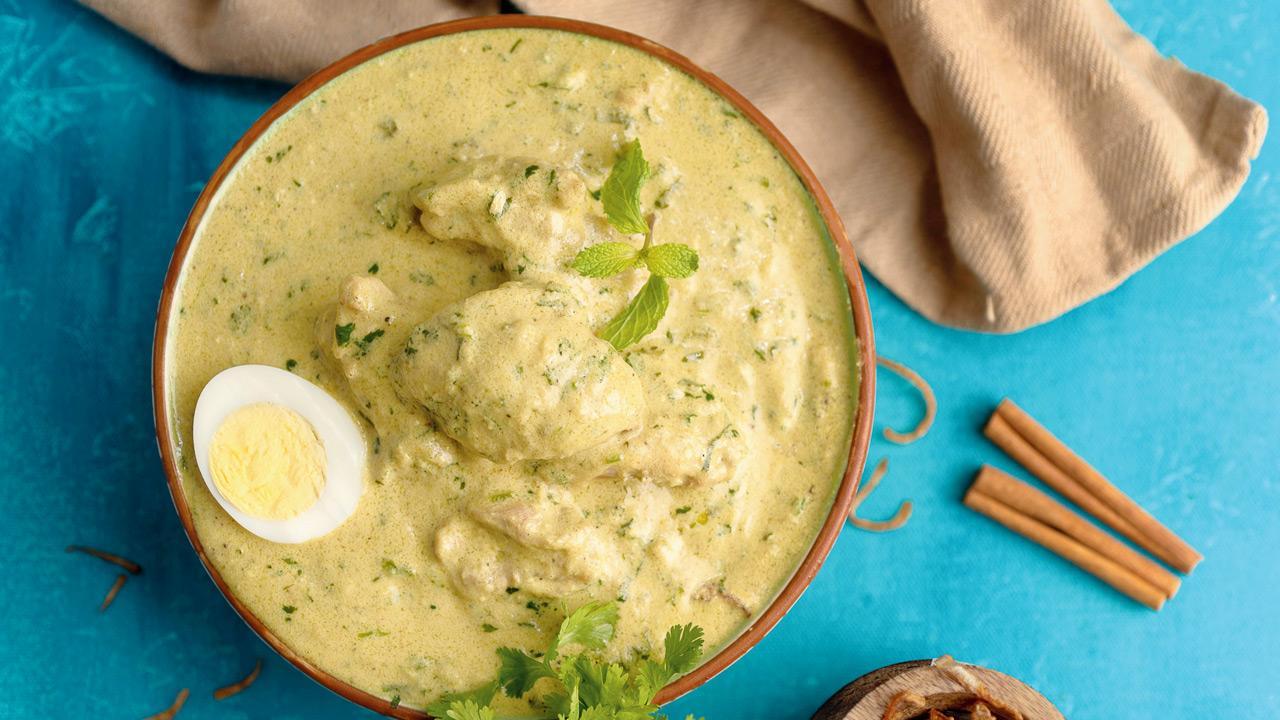Inspired by the rich cuisine of Kangra and other ancient Indian kingdoms, this Mumbai chef wants you to eat like the royals

Begum Shah Jahan’s Bhopali rezala has a distinct flavour of fresh coriander lending a tangy and fresh taste to the curry, traditionally garnished with a boiled egg
With the explosion of delivery kitchens in the pandemic, chef and restaurant consultant Amit Puri knew he’d need a standout concept to get noticed. “We wanted to serve the popular kebabs and curries, but also introduce patrons to flavours otherwise not easily found on conventional restaurant menus,” he says. In April, Puri teamed up with a few friends to launch The Blue Tiffin.
Thanjavur komdiche kebab
The rich blue logo signifies royalty, wealth and reliability, while the tiffin—delivered in eco-friendly packaging—denotes comfort. From recipes that hark back to the Maratha rule in Tanjore to those exclusive to the Kangra royal family, considered to be the world’s oldest surviving royal family with Rajput roots, the menu is a culinary mosaic. The research and food trials went on for seven months, recalls Puri. “I gleaned inspiration from the royal food that I had a chance to sample during my travels to Rajasthan, Indore, Chennai, Lucknow, Hyderabad and Jammu and Kashmir. To make sure it’s authentic, I pored over culinary books by historians and a lot of online literature.” The dishes that made the cut were those that had a distinct flavour profile. The Kangra boondi ka khatta (Rs 280), for instance, is a famous mildly-sour, yoghurt-based curry from Himachal Pradesh. “Kangra royal food is homely and intense. Brahmin cooks called bawarchis were the initial innovators of the food in the Kangra region and were commissioned to cook on special occasions.” Here, the fatty combination of ghee, khoya and curd is balanced with khatta, a sweet and sour sauce made with imli, jaggery and mango powder. “In fact, I follow my mother-in-law’s recipe. I have had the boondi ka khatta so many times at home, but it was only post research that I learnt about the royal roots of the recipe.”
Indori makai ki kees
According to Puri, Himachali cuisine, known as Dham, is in many ways similar to the multi-course Kashmiri wazwan. The star preparation of the dham is usually Madra, which is a smaller variety of rajma cooked in yogurt and sometimes, mustard oil, on a low flame in a thick brass pot called charoti. In order to make it diverse and inclusive, Puri has tried to bring in elements from various parts of the Indian subcontinent. The recipes in the Maratha Kingdom of Tanjore or Thanjavur were highly influenced by ingredients found locally in Tamil Nadu, he tells us. “After the end of Chola rule in Tanjore, the city in Tamil Nadu was taken over by the Marathas for close to two centuries. There’s a theory that the popular South Indian sambar was invented by the Marathas of Tanjore when Maharashtrian cooks, while preparing amti, replaced moong dal with tur dal and used tamarind for sourness instead of kokum. It continues that the dish got its name from Sambhaji, the Maratha emperor.”
Amit Puri
The menu also features the Bhopali Razala (Rs 420), a creamy chicken curry introduced to the state by the last nawab of Awadh, Wajid Ali Shah. “For some reason, knowledge of the Rezala is limited to West Bengal. Rezala is a rich curry of Turkish and Persian origin. The thick, white gravy is made with cashew and cream that has a few variations across different cities, the most common being the Bengali Rezala. However, Begum Shah Jahan’s Bhopali Rezala has a distinct flavour of fresh coriander lending a tangy and fresh flavour to the curry that is traditionally garnished with a boiled egg.” Just because the dishes are royal, doesn’t mean they are complicated. The Rajasthani junglee maas (Rs 340), for instance, is an easy preparation with just five ingredients: ghee, garlic, chilli, salt and mutton. “It is such a wonderful recipe, perhaps too simple to be on a commercial menu. I wanted to retain the [authenticity] of the preparation and I now serve it the in the form of a samosa. It has been appreciated by customers.”
Kangra boondi ka khatta
Ingredients
2 tbsp besan
2 cups water
2 tbsp ghee
1 tsp cumin seeds
1 tsp mustard seeds
1 sprig curry leaves
1/4 tsp Fenugreek seeds
1 tsp ginger chopped
1/2 tsp asafoetida
1/2 tsp red chili powder
1/2 tsp turmeric powder
1 tbsp coriander powder
1/2 tsp cumin powder
3 tsp tamarind pulp
3 tsp jaggery, chopped
1/2 cup khara boondi
Final tadka
2 tsp ghee
1/2 tsp cumin seeds
1/2 tsp whole red chilli
Method
Mix the gram flour and water in a bowl and keep aside. Heat ghee in a pan over medium flame. Add cumin seeds and mustard seeds and curry leaves. Allow them to splutter. Add fenugreek seeds, ginger and asafoetida to the pan. Add the dry masalas and mix well. Make sure not to burn the masalas. Add in the gram flour slurry in the pan and mix well. Add the tamarind pulp and jaggery and cook for a couple of minutes till the curry thicken. Meanwhile, place boondi in a serving bowl and keep aside. Transfer the curry to the serving bowl consisting boondi. For tempering, heat ghee in another pan. Add cumin seeds and allow to splutter. Add in the red chilli and mix well. Pour the tempering on top and serve with white rice.
To Order: Via Swiggy, Zomato and thrivenow.in
 Subscribe today by clicking the link and stay updated with the latest news!" Click here!
Subscribe today by clicking the link and stay updated with the latest news!" Click here!









